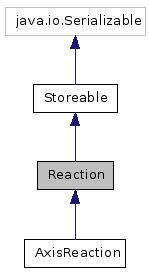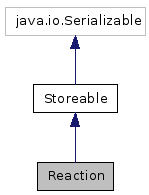Reaction Class Reference
A process with initial and final states defined in terms of Particles. More...


Public Member Functions | |
| Reaction () | |
| No-arg constructor. | |
| Set< Particle > | getInitialState () |
| Get initial state. | |
| Reaction | setInitialState (Set< Particle > initialState) |
| Set initial state. | |
| Reaction | addToInitialState (Particle particle) |
| Add a particle (with multiplicity) into the initial state. | |
| Reaction | removeFromInitialState (Particle particle) |
| Remove a particle (with multiplicity) from the initial state: this will only remove the corresponding multiplicity from the state, without going negative. | |
| Reaction | purgeFromInitialState (Particle particle) |
| Remove all particles of this type from the initial state. | |
| Set< Particle > | getFinalState () |
| Get final state. | |
| Reaction | setFinalState (Set< Particle > finalState) |
| Set final state. | |
| Reaction | addToFinalState (Particle particle) |
| Add a particle (with multiplicity) into the final state. | |
| Reaction | removeFromFinalState (Particle particle) |
| Remove a particle (with multiplicity) from the final state: this will only remove the corresponding multiplicity from the state, without going negative. | |
| Reaction | purgeFromFinalState (Particle particle) |
| Remove all particles of this type from the final state. | |
| boolean | equals (Object other) |
| Compare reactions for equality. | |
| String | initialStateToString () |
| String representation of the initial state. | |
| String | finalStateToString () |
| String representation of the final state. | |
| String | toString () |
| String representation of this Reaction. | |
Package Functions | |
| .hibernate.annotations.CollectionOfElements.hibernate.annotations. | CollectionId (columns=@Column(name="InitialStateId"), type=@org.hibernate.annotations.Type(type="long"), generator="sequence") private Set< Particle > _initialState |
| A collection of particles and multiplicities in the initial state. | |
| .hibernate.annotations.CollectionOfElements.hibernate.annotations. | CollectionId (columns=@Column(name="FinalStateId"), type=@org.hibernate.annotations.Type(type="long"), generator="sequence") private Set< Particle > _finalState |
| A collection of particles and multiplicities in the final state. | |
| Logger | log () |
| Neat method to allow every class to get hold of a custom-named Logger. | |
Detailed Description
A process with initial and final states defined in terms of Particles.
- Version:
- Date
- 2007-10-26 18:14:44 +0100 (Fri, 26 Oct 2007)
- Revision
- 1110
Definition at line 19 of file Reaction.java.
Constructor & Destructor Documentation
| Reaction | ( | ) |
Member Function Documentation
| .hibernate.annotations.CollectionOfElements.hibernate.annotations. CollectionId | ( | columns | = @Column(name="InitialStateId"), |
|
| type | = @org.hibernate.annotations.Type(type="long"), |
|||
| generator | = "sequence" | |||
| ) | [package] |
A collection of particles and multiplicities in the initial state.
| .hibernate.annotations.CollectionOfElements.hibernate.annotations. CollectionId | ( | columns | = @Column(name="FinalStateId"), |
|
| type | = @org.hibernate.annotations.Type(type="long"), |
|||
| generator | = "sequence" | |||
| ) | [package] |
A collection of particles and multiplicities in the final state.
| Set<Particle> getInitialState | ( | ) |
Add a particle (with multiplicity) into the initial state.
If a particle of the same type already exists, the multiplicities will be combined.
Definition at line 64 of file Reaction.java.
References Particle.getMultiplicity().
00064 { 00065 boolean foundType = false; 00066 for (Particle p : _initialState) { 00067 if (Particle.sameType(p, particle)) { 00068 foundType = true; 00069 p.setMultiplicity(p.getMultiplicity() + particle.getMultiplicity()); 00070 break; 00071 } 00072 } 00073 if (!foundType) _initialState.add(particle); 00074 return this; 00075 }
Remove a particle (with multiplicity) from the initial state: this will only remove the corresponding multiplicity from the state, without going negative.
If you want to remove all the particles of a given type from the state, use purgeFromInitialState().
Definition at line 82 of file Reaction.java.
References Particle.getMultiplicity().
00082 { 00083 for (Particle p : _initialState) { 00084 if (Particle.sameType(p, particle)) { 00085 int newMult = p.getMultiplicity() - particle.getMultiplicity(); 00086 if (newMult <= 0) { 00087 _initialState.remove(p); 00088 } else { 00089 p.setMultiplicity(newMult); 00090 } 00091 break; 00092 } 00093 } 00094 return this; 00095 }
Remove all particles of this type from the initial state.
Definition at line 97 of file Reaction.java.
00097 { 00098 for (Particle p : _initialState) { 00099 if (Particle.sameType(p, particle)) { 00100 _initialState.remove(p); 00101 } 00102 } 00103 return this; 00104 }
| Set<Particle> getFinalState | ( | ) |
Add a particle (with multiplicity) into the final state.
If a particle of the same type already exists, the multiplicities will be combined.
Definition at line 120 of file Reaction.java.
References Particle.getMultiplicity().
00120 { 00121 boolean foundType = false; 00122 for (Particle p : _finalState) { 00123 if (Particle.sameType(p, particle)) { 00124 foundType = true; 00125 p.setMultiplicity(p.getMultiplicity() + particle.getMultiplicity()); 00126 break; 00127 } 00128 } 00129 if (!foundType) _finalState.add(particle); 00130 return this; 00131 }
Remove a particle (with multiplicity) from the final state: this will only remove the corresponding multiplicity from the state, without going negative.
If you want to remove all the particles of a given type from the state, use purgeFromFinalState().
Definition at line 138 of file Reaction.java.
References Particle.getMultiplicity().
00138 { 00139 for (Particle p : _finalState) { 00140 if (Particle.sameType(p, particle)) { 00141 int newMult = p.getMultiplicity() - particle.getMultiplicity(); 00142 if (newMult <= 0) { 00143 _finalState.remove(p); 00144 } else { 00145 p.setMultiplicity(newMult); 00146 } 00147 break; 00148 } 00149 } 00150 return this; 00151 }
Remove all particles of this type from the final state.
Definition at line 153 of file Reaction.java.
00153 { 00154 for (Particle p : _finalState) { 00155 if (Particle.sameType(p, particle)) { 00156 _finalState.remove(p); 00157 } 00158 } 00159 return this; 00160 }
| boolean equals | ( | Object | other | ) |
Compare reactions for equality.
Definition at line 167 of file Reaction.java.
References Reaction.getFinalState(), and Reaction.getInitialState().
00167 { 00168 log().debug("Comparing reactions..."); 00169 if (this == other) return true; 00170 if (! (other instanceof Reaction)) return false; 00171 final Reaction test = (Reaction) other; 00172 00173 if (! this.getInitialState().equals( test.getInitialState() )) return false; 00174 if (test.getInitialState() != null && this.getInitialState() != null) { 00175 Set<Particle> is1 = this.getInitialState(); 00176 Set<Particle> is2 = test.getInitialState(); 00177 if (is1.size() != is2.size()) return false; 00178 for (Particle p : is1) { 00179 if (! is2.contains(p)) return false; 00180 } 00181 } 00182 00183 if (! this.getFinalState().equals( test.getFinalState() )) return false; 00184 if (test.getFinalState() != null && this.getFinalState() != null) { 00185 Set<Particle> fs1 = this.getFinalState(); 00186 Set<Particle> fs2 = test.getFinalState(); 00187 if (fs1.size() != fs2.size()) return false; 00188 for (Particle p : fs1) { 00189 if (! fs2.contains(p)) return false; 00190 } 00191 } 00192 00194 00195 // If not proven guilty... 00196 return true; 00197 }
| String initialStateToString | ( | ) |
String representation of the initial state.
Definition at line 206 of file Reaction.java.
00206 { 00207 StringBuffer s = new StringBuffer(); 00208 for (Particle ispart : getInitialState()) { 00209 s.append(" " + ispart.toString()); 00210 } 00211 return s.toString().trim(); 00212 }
| String finalStateToString | ( | ) |
String representation of the final state.
Definition at line 216 of file Reaction.java.
00216 { 00217 StringBuffer s = new StringBuffer(); 00218 for (Particle fspart : getFinalState()) { 00219 s.append(" " + fspart.toString()); 00220 } 00221 return s.toString().trim(); 00222 }
| String toString | ( | ) |
String representation of this Reaction.
Reimplemented from Storeable.
Definition at line 226 of file Reaction.java.
00226 { 00227 StringBuffer s = new StringBuffer(); 00228 s.append(initialStateToString()); 00229 s.append(" -> "); 00230 s.append(finalStateToString()); 00231 return s.toString().trim(); 00232 }
| Logger log | ( | ) | [package, inherited] |
Neat method to allow every class to get hold of a custom-named Logger.
Definition at line 14 of file Storeable.java.
Referenced by Uncertainty.compareTo(), Reference.compareTo(), PointError.compareTo(), Modification.compareTo(), Experiment.compareTo(), DatasetError.compareTo(), AxisError.compareTo(), Data.makeExample(), Data.makeExampleDataset(), Data.makeExampleExperiment(), Data.makeExamplePaper(), Data.makeExampleXAxes(), Data.makeExampleYAxes(), AxisError.setAxis(), DatasetError.setDataset(), DatasetError.setNormType(), PointError.setPoint(), and Uncertainty.toString().
The documentation for this class was generated from the following file:
- /home/buckley/hepdata/codedocs/src/hepdata/hepdata-model/src/main/java/cedar/hepdata/model/Reaction.java
 1.5.5
1.5.5